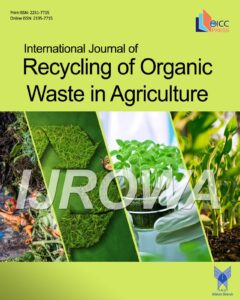Co-inoculation of Beijerinckia indica subsp. indica and Cunninghamella elegans spp. enriches cattle manure and promotes the growth of pepper (Capsicum baccatum)
Authors
-
A Y M Hernandez
 1
1
-
F De Alcantara Neto
 1
1
-
J E L Antunes
 2
2
-
A Bonifácio
 3
3
-
A D S De Freitas
 4
4
-
F F Araújo
 5
5
-
A F Dutra
 1
1
-
M R L Leite
 1
1
-
R S Sousa
*
 2
2
- A S F Araújo 2
Abstract
Purpose This study aimed to evaluate the effects of different organic residues and beneficial microorganisms on the growth and yield of pepper (Capsicum baccatum).
Method Cattle manure (CM), earthworm humus (EH), and sugarcane filter cake (SFC) were enriched with Beijerinckia indica subsp. indica and Cunninghamella elegans spp. Chemical analysis revealed that CM had the highest contents of nitrogen (N), magnesium (Mg), carbon (C), and organic matter. The potential of CM contribution to the growth and yield of pepper was assessed using a pot experiment.
Results Enriched CM, which had the highest values of N, and Mg, linearly increased both morphological and nutritional parameters, enhancing plant growth and accumulation of N, phosphorus (P), and potassium (K) in both the shoots and roots of pepper.
Conclusion The enrichment of organic wastes with B. indica and C. elegans could be an alternative biological strategy to improve the quality of these wastes. Particularly, the enriched CM contributed to the increase in pepper growth.
Highlights
- Cattle manure (CM) enriched with indica and C. elegans presented highest content of nutrients.
- The application of enriched CM increased linearly the growth of pepper and accumulation of N, P, and K in both shoot and roots.
- A potential use of this microbially enriched CM to promote higher production of pepper.



